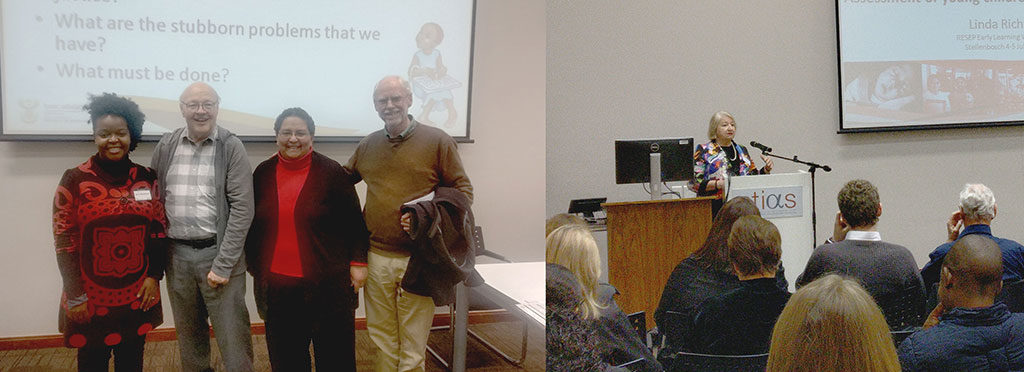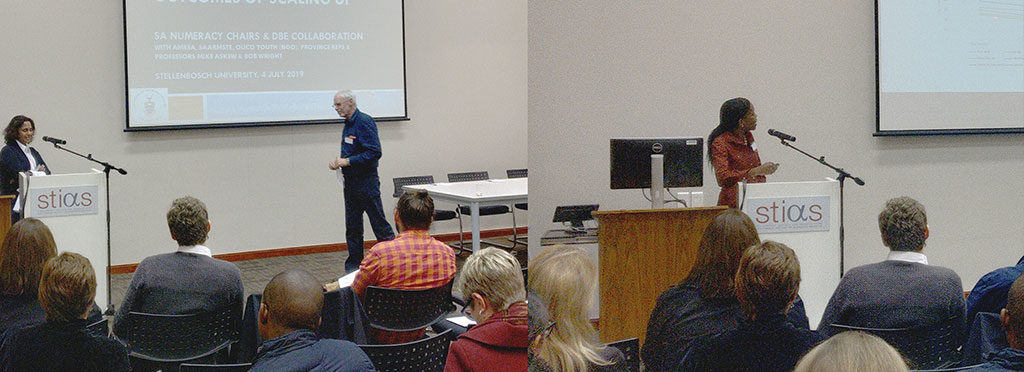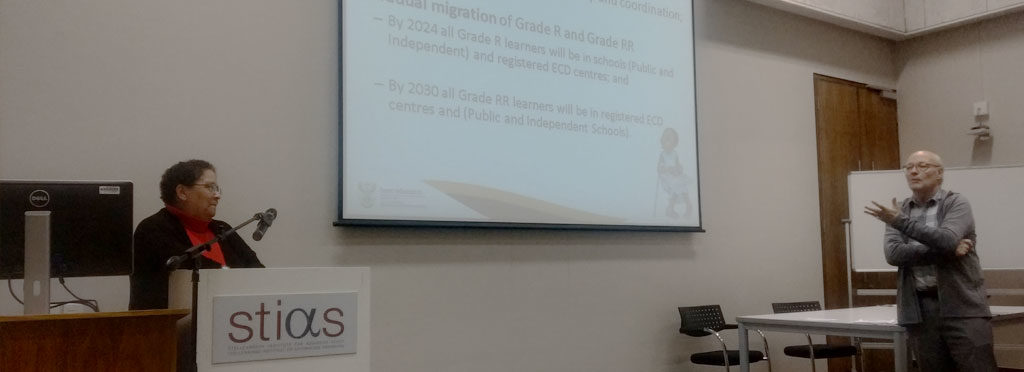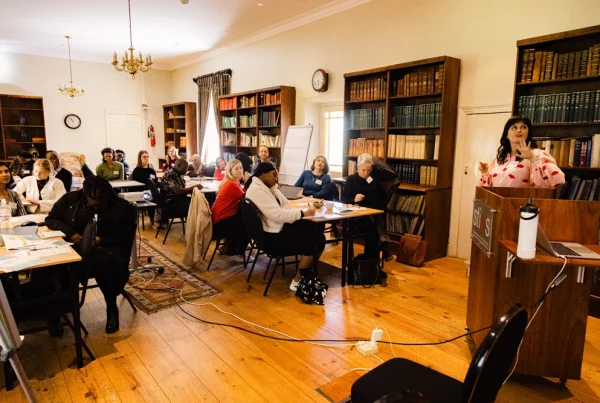On 20 June 2019, President Cyril Ramaphosa included reading for meaning in the early grades as one of the topic 5 strategic areas for South Africa to focus on in his State of the Nation Address:
“Let us agree, as a nation and as a people united in our aspirations, that within the next 10 years we will have made progress in tackling poverty, inequality and unemployment, where…Our schools will have better educational outcomes and every 10-year-old will be able to read for meaning” via News 24.
This was a response to strategic policy inputs related to the Early Grade Reading Study and our earlier work on “Identifying Binding Constraints in Education”. It is encouraging to see this recommendation absorbed as a key national strategy, but there is a critical need to accelerate our understanding of solutions to address learning challenges in South Africa if we are to realise this goal within the next decade.

Against this background, RESEP has commenced a new project with the support of the Allan Gray Orbis Foundation Endowment. This will be focussing on Early Learning which we define, for our purposes, as learning up to and including grade 4, because of the important language switch in that grade. To kickstart this project, we convened a two-day workshop at STIAS from 4 to 5 July 2019, with participation from key academics and policymakers engaged in early learning research or implementation of improvement programmes. Topics covered include early childhood development and related programmes to improve the quality of grade R and ECD service delivery, assessment of children before they reach school-going age, reading trajectories in early grades and programmes to improve reading outcomes in school. A few sessions also touched on language – the politics and policies of language development and the age-old debate of a language switch to teaching in English in grade 4. A list of presentations, key highlights and links to these presentations is provided below.
Beyond the value of sharing in a wealth of knowledge from prolific South African researchers, one of the greatest values of workshops are the informal conversations and connections made across institutions and disciplines. We highlight one in particular: the value of convening together academics and policymakers working on early child development with those grappling with the challenges of learning in school. There is arguably too little attention given to connecting our understanding of learning gaps in school with development delays which accrue at much earlier ages. As Servaas van Berg reflected, drawing on Feinstein and Duckworth (2006:1) “A failure of family and school contexts to build on the early cognitive development of bright children from low SES groups… may be a crucial and under-recognised difference between children from disadvantaged and advantaged backgrounds and a key reason for social immobility.” Those working in ECD remind us of the importance of a multi-sectoral approach that is required to address the learning deficits that we diagnose at school-level yet start much earlier on.

We are grateful for the participation of those who attended. For a younger academic like me, events such as these make one acutely aware of the wealth of experience of those who have been working in the field for much longer. As Linda Richter reflected in her presentation, we need to think carefully about how we institutionalise knowledge and programmes, so that a wealth of existing knowledge, data, assessments and programmes are not lost. We must dig deeper; locate what we need in a museum of data and knowledge that exists before we ‘reinvent’ what has already been done. If we are to forge a way in improving the quality of learning for South African children (and realising our President’s new goal), we cannot waste time rehashing what has already been done before.

Day 1 (4 July 2019)
Servaas van der Berg: Introduction
Servaas set the scene for the day highlighting how the ‘odds are stacked against poor children’ quoting from Feinstein and Duckworth (2006:1). See his particularly useful final slide on “some things we still need to know”.
Click here to download the full presentation
Linda Richter – Assessment of young children – Why and How?
Linda outlines some first principles in relation to assessment of young children and the tests that are currently available. The challenge is not that no tests are available. We just don’t use them enough, fail to validate them and then even when we do, fail to institutionalise tests that work. In general, we need to think carefully about the longevity of knowledge and programmes.
Click here to download the full presentation
Linda Zuze (RESEP) – What do international studies tell us about early learning?
Linda provided an account of early learning in Zambia, Malawi and South Africa using SACMEQ and EGRA testing. During the presentation, Linda highlighted age population dynamics in Zambia, noting how extensive teenage pregnancy is in the nation. When a large proportion of mothers are teens, this may substantially impact on how one positions early childhood development initiatives.
Click here to download the full presentation.
Hamsa Venkat (WITS) – Measuring and improving foundation phase number outcomes.
Hamsa provides some evidence from a very promising small-scale training programme for mathematics teachers to get them to teach problem-solving techniques to improve the efficiency of learner’s calculations. For those of us who still count on our fingers…. there are better approaches!
Click here to download the full presentation.
Andrew Dawes and Matthew Snelling (ELOM, UCT) – The Innovation Edge comparative study of South African early learning programme outcomes.
Andrew and Matthew provided interesting results from evaluating the effectiveness of different ECD programmes in South Africa. Their evaluation used ELOM and they suggest that different programmes are of varying quality as exhibited in differential development trajectories of young children.
Click here to download the full presentation.
Cally Kuhne and Shelly O-Carrol (Wordworks) – Implementing a Gr-R intervention at scale – lessons learnt
Cally and Shelly shared their significant experience and the details of implementing the R-Maths programme. In their concluding slides, they identify some useful lessons for thinking about institutionalising experimental programmes within provincial functions.
Nwabisa Makaluza (Funda Wande) – Equipping Grade R-3 teachers to teach reading for meaning in African languages: Resources, Coaching and Training.
Funda Wande is starting to make significant ground in the Eastern Cape in providing training in the teaching of language to teachers and subject advisors. They also highlight plans for future interventions – this time in mathematics. For those in linguistics or language, check out their fascinating work in mapping out the corpus of isiXhosa texts with a preliminary model to determine text difficulty in isiXhosa.
Click here to download the full presentation.
Stephen Taylor (DBE) – The sustainability of early education interventions: Do learning gains and improved teacher practices persist?
If we are talking about our president’s aspirations for children to read for meaning, then coaching models are showing some promise in improving not only reading outcomes but shaping teacher practice. Stephen outlines some of the most significant evidence available in South Africa of a programme that shifts reading outcomes. The presentation also grapples with the challenges of sustainability of interventions – effect sizes diminish with time implying that on-going coaching and training of teachers in school is necessary.
Day 2 (5 July 2019):
Brahm Fleish (WITS) – What do we know about system-wide instructional change to improve early grade learning? Evidence from international and South African research.
Brahm has been involved in a number of interventions that grapple with how to improve early grade learning. It is instructive seeing the results of various studies come together to shape improvements and shift our understanding of how to implement system-wide changes in instruction. There is much more value in cumulative learning from various interventions than just considering them in isolation.
Click here to download the full presentation
Cally Ardington and Ursula Hoadley (UCT) – Sparking a love of reading – Fidelity, impact and sustainability of Story Powered Schools (cohort one)
Cally and Ursula’s presentation on first cohort intervention results from the Story Powered Schools programme, highlights the importance of using monitoring and evaluation data to assess the fidelity of the implementation of programmes. Results are often not observed in studies not because of a poor programme but due to poor implementation. It also highlights that interventions need to be structured into the school day – we cannot impose change from the outside. Again, Linda Richter’s opening remarks hold – we must grapple with the importance of institutionalising programmes.
Elizabeth Pretorius (UNISA) – How does the early reading trajectory in Nguni languages differ when we intervene or don’t?
There are few people who can articulate as clearly the value of decoding and foundational reading skills to set children on a positive reading trajectory as Elizabeth Pretorius. This was an invaluable presentation. The Zenlit results also suggest best possible reading trajectory improvements we could see from intensive teacher training.
Click here to download the full presentation
Surette van Staden & Mishack Tshele (UP) – The language in education conundrum from an empirical perspective. Using evidence to inform policy
We can’t ignore that differences between the language of learning and teaching in schools and learners’ home language may significantly shape learning outcomes of young children. Surette and Mishack’s presentation highlights this using the PIRLS 2016 data.
Click here to download the full presentation
Nompumelelo Mohohlwane (DBE) – How language policy or practice creates and sustains inequality in education
Developing a language requires much more than good intention. The successful development of Afrikaans depended on an institutionalised process and the support of numerous initiatives. Lessons can be learnt from this process in relation to the development of African languages.
Click here to download the full presentation
Catherine Draper (Wits) & Caylee Cook (UCT)
Contrary to the deficit narrative that surrounds learning in South Africa, Catherine and Caylee share fascinating data on executive functioning skills of children in poor communities in South Africa. For those of you thinking of immigrating; think twice. They suggest that South African young children from poor communities may have better executive function than children in Australia!
Click here to download the full presentation
Marie-Louise Samuels (DBE) – Access, Equity, Quality, Efficiency, Inclusivity, Social Justice in ECD
Marie-Louise Samuels, Director of Early Childhood Development at the DBE, provides an account of policy change and priorities in ECD in South Africa, highlighting issues of social justice in ECD service delivery. Her slide on the timeline of the introduction of new policies and legislation affecting the ECD landscape in Post-Apartheid South Africa is particularly informative.
Click here to download the full presentation






